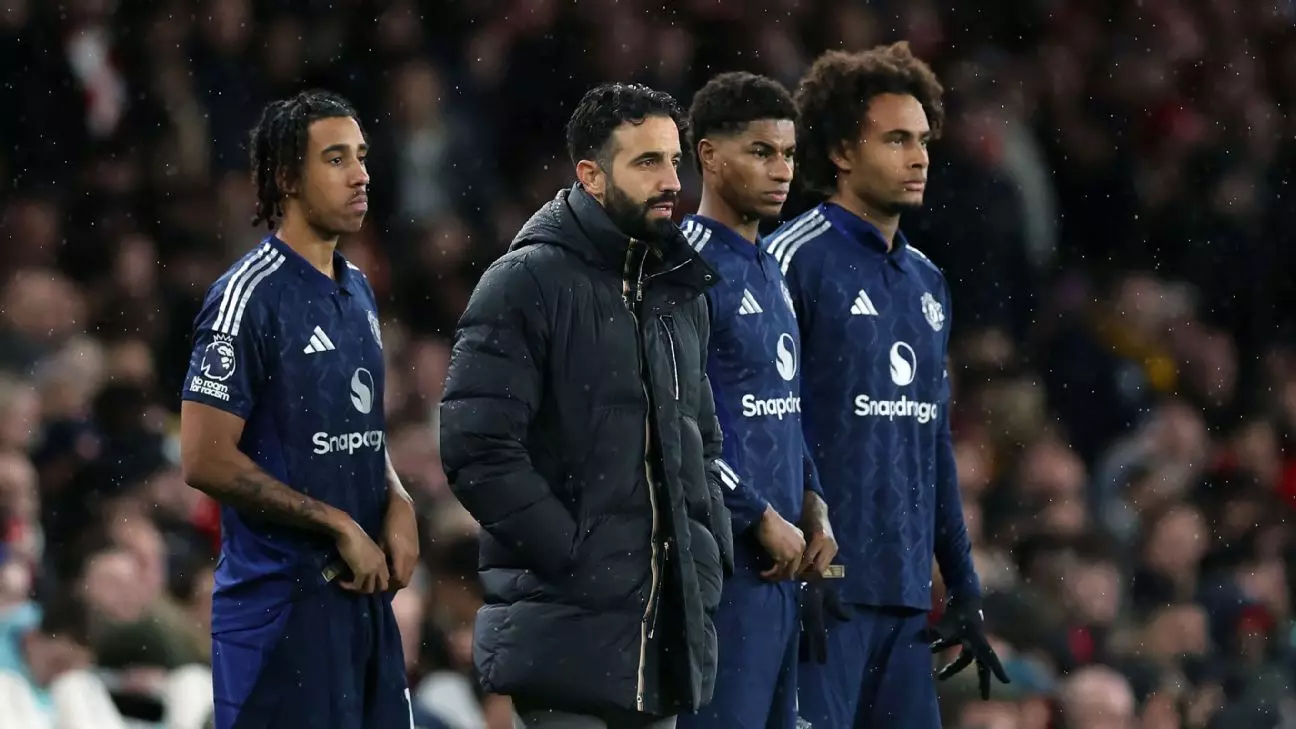Ruben Amorim’s recent stint as manager of Manchester United has already been marked by significant challenges, particularly as he dealt with a lineup rife with injuries. His first match in charge ended with a challenging 2-0 defeat at the hands of Arsenal, spotlighting the hurdles he faces in his new role. In this article, we will delve into the implications of player fitness on team performance and how Amorim can chart a path forward amidst these adversities.
One of the most pressing issues for Amorim is the injury-plagued roster that undermines his strategic vision for the team. At the Emirates, key players such as Harry Maguire, Tyrell Malacia, and Mason Mount were introduced into the game but were limited in their impact due to their recent recoveries. The challenges here are numerous: not only does this lack of fitness alter game strategy, but it can also disrupt team chemistry. Every substitution designed to compensate for injury must navigate around players who are still regaining their strength and rhythm, making Amorim’s task all the more daunting.
Moreover, the inclusion of summer signing Leny Yoro, who made his first appearance after a lengthy absence due to a foot injury, illustrates the delicate balance managers must maintain between bringing players back into the fold and ensuring they are not pushed too hard too soon. In high-stakes situations like the match against Arsenal, the risk of exacerbating injuries further complicates game planning, as players can’t be relied upon to perform at their peak.
Amorim has openly acknowledged the constraints he faces in integrating injured players back into the lineup. He noted that each player has what he termed a “time limit,” suggesting a meticulous approach to managing their return. This situation hints at a nuanced problem: when players are on strict returns to fitness, the dynamics of play must evolve, impacting the overall tempo and strategy.
His comments reflect an understanding that modern football is a complex game where adaptability can be a double-edged sword. A rigid structure might prove ineffective when the squad is undergoing significant change fueled by injuries. Amorim has indicated a need for a ‘different methodology,’ recognizing that adjustments require more than just tactical shifts; they necessitate a comprehensive recalibration of team ambitions.
Despite the sobering loss at Arsenal, Amorim emphasized the importance of extracting positive insights. In the face of disappointing results, maintaining an optimistic outlook can be crucial for morale and progress. His perspective is grounded in recognizing player potential and the overall atmosphere of the game, despite the scoreline. For instance, he recounted moments within the first half where the team could sense discomfort from the opposing side, signaling that perhaps there were elements of promise even amidst the loss.
This approach is vital, as it can keep the players motivated and focused on incremental improvements rather than dwelling solely on defeat. Such philosophy is essential not just for Amorim’s credibility as a manager but also for fostering a resilient mindset among the squad.
Amorim’s comments about Luke Shaw further underscore his commitment to long-term player welfare over short-term gains. With Shaw grappling with the repercussions of extended injury rehabilitation, Amorim expressed a willingness to provide him with the necessary time to return to full fitness. This indicates a broader philosophy prioritizing player health, emphasizing that recovering from injuries is as critical as tactical adjustments or match strategies.
It’s a testament to Amorim’s understanding of the sport: successful management transcends immediate results and focuses on sustainability. A well-managed squad that is healthy and mentally prepared stands a higher chance of long-term success.
As Ruben Amorim navigates these tumultuous beginning stages at Manchester United, he faces a unique convergence of challenges that can either undermine or solidify his tenure. The injuries limiting player participation represent both a daunting obstacle and an opportunity to showcase his managerial acumen. By balancing immediate needs with long-term goals, Amorim can lay down a foundation for not only the current season but for a revitalized future at one of football’s most storied clubs. The ability to foster resilience, adaptability, and a positive mindset will be crucial as he shapes a squad laden with potential.

